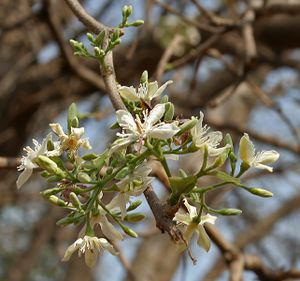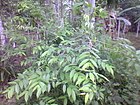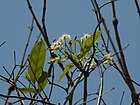Note: This is a project under development. The articles on this wiki are just being initiated and broadly incomplete. You can Help creating new pages.
Difference between revisions of "Wrightia tinctoria - Svetakutaja"
(→Commonly seen growing in areas) |
|||
| Line 57: | Line 57: | ||
==Commonly seen growing in areas== | ==Commonly seen growing in areas== | ||
| − | {{Commonly seen|Dry soil region}}, {{Commonly seen|deciduous | + | {{Commonly seen|Dry soil region}}, {{Commonly seen|deciduous forests}}. |
==Photo Gallery== | ==Photo Gallery== | ||
Revision as of 11:20, 18 June 2018
Wrightia tinctoria is a flowering plant species in the genus Wrightia found in India, southest Asia and Australia. It is found in dry and moist regions in its distribution. Various parts of the plant have medicinal properties.
Contents
- 1 Uses
- 2 Parts Used
- 3 Chemical Composition
- 4 Common names
- 5 Properties
- 6 Habit
- 7 Identification
- 8 List of Ayurvedic medicine in which the herb is used
- 9 Where to get the saplings
- 10 Mode of Propagation
- 11 How to plant/cultivate
- 12 Commonly seen growing in areas
- 13 Photo Gallery
- 14 References
- 15 External Links
Uses
Psoriasis, Cancer, Wound, Obesity, Diabetes, Pain, Pimples, Diarrhea, Sore throats
Parts Used
Chemical Composition
Cycloartenone, Cycloeucalenol, Beta-Amyrin, Beta Sitosterol [1]
Common names
| Language | Common name |
|---|---|
| Kannada | Kodamurki |
| Hindi | Dudhi, Karayaja |
| Malayalam | Aiyappala, Kampippaala |
| Tamil | Veppalai |
| Telugu | Amkuda |
| Marathi | NA |
| Gujarathi | NA |
| Punjabi | NA |
| Kashmiri | NA |
| Sanskrit | Stri Kutaja |
| English | Pala Indigo, Sweet indrajao |
Properties
Reference: Dravya - Substance, Rasa - Taste, Guna - Qualities, Veerya - Potency, Vipaka - Post-digesion effect, Karma - Pharmacological activity, Prabhava - Therepeutics.
Dravya
Rasa
Tikta (Bitter), Kashaya (Astringent)
Guna
Laghu (Light), Ruksha (Dry), Tikshna (Sharp)
Veerya
Ushna (Hot)
Vipaka
Katu (Pungent)
Karma
Kapha, Vata
Prabhava
Habit
Identification
Leaf
| Kind | Shape | Feature |
|---|---|---|
| Simple | opposite | Leaves are distichous, estipulate; petiole 2-5 mm long, stout, glabrous |
Flower
| Type | Size | Color and composition | Stamen | More information |
|---|---|---|---|---|
| Bisexual | 1.5 mm long | white | 5 | Flowers Season is June - August and scented, in terminal cymes appearing along with new leaves |
Fruit
| Type | Size | Mass | Appearance | Seeds | More information |
|---|---|---|---|---|---|
| 15-45 cm long | clearly grooved lengthwise, Lowest hooked hairs aligned towards crown | With hooked hairs | {{{6}}} |
Other features
List of Ayurvedic medicine in which the herb is used
- Vishatinduka Taila as root juice extract
Where to get the saplings
Mode of Propagation
How to plant/cultivate
Wrightia tinctoria is a plant of arid, semi-arid and moist regions in the tropics, where it can be found at elevations up to 1,200 metres. It is found in areas where the mean annual rainfall is within the range 400 - 2,500mm, and the mean temperature range 17 - 25°c.[3]
Commonly seen growing in areas
Dry soil region, deciduous forests.
Photo Gallery
References
External Links
- Ayurvedic Herbs known to be helpful to treat Psoriasis
- Ayurvedic Herbs known to be helpful to treat Cancer
- Ayurvedic Herbs known to be helpful to treat Wound
- Ayurvedic Herbs known to be helpful to treat Obesity
- Ayurvedic Herbs known to be helpful to treat Diabetes
- Ayurvedic Herbs known to be helpful to treat Pain
- Ayurvedic Herbs known to be helpful to treat Pimples
- Ayurvedic Herbs known to be helpful to treat Diarrhea
- Ayurvedic Herbs known to be helpful to treat Sore throats
- Herbs with Leaves used in medicine
- Herbs with flowers used in medicine
- Herbs with common name in Kannada
- Herbs with common name in Hindi
- Herbs with common name in Malayalam
- Herbs with common name in Tamil
- Herbs with common name in Telugu
- Herbs with common name in Sanskrit
- Herbs with common name in English
- Habit - Deciduous Tree
- Index of Plants which can be propagated by Seeds
- Index of Plants which can be propagated by Cuttings
- Herbs that are commonly seen in the region of Dry soil region
- Herbs that are commonly seen in the region of deciduous forests
- Herbs




